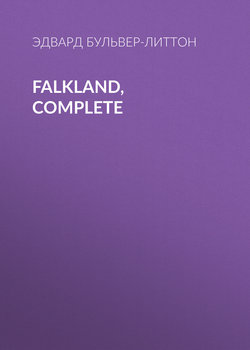Читать книгу Falkland, Complete - Эдвард Джордж Бульвер-Литтон, Эдвард Бульвер-Литтон - Страница 2
BOOK I
FROM ERASMUS FALKLAND, ESQ., TO THE HON. FREDERICK MONKTON
ОглавлениеL–, May —, 1822.
You are mistaken, my dear Monkton! Your description of the gaiety of “the season” gives me no emotion. You speak of pleasure; I remember no labour so wearisome; you enlarge upon its changes; no sameness appears to me so monotonous. Keep, then, your pity for those who require it. From the height of my philosophy I compassionate you. No one is so vain as a recluse; and your jests at my hermitship and hermitage cannot penetrate the folds of a self-conceit, which does not envy you in your suppers at D– House, nor even in your waltzes with Eleanor.
It is a ruin rather than a house which I inhabit. I have not been at L– since my return from abroad, and during those years the place has gone rapidly to decay; perhaps, for that reason, it suits me better, tel maitre telle maison.
Of all my possessions this is the least valuable in itself, and derives the least interest from the associations of childhood, for it was not at L– that any part of that period was spent. I have, however, chosen it from my present retreat, because here only I am personally unknown, and therefore little likely to be disturbed. I do not, indeed, wish for the interruptions designed as civilities; I rather gather around myself, link after link, the chains that connected me with the world; I find among my own thoughts that variety and occupation which you only experience in your intercourse with others; and I make, like the Chinese, my map of the universe consist of a circle in a square—the circle is my own empire and of thought and self; and it is to the scanty corners which it leaves without, that I banish whatever belongs to the remainder of mankind.
About a mile from L– is Mr. Mandeville’s beautiful villa of E–, in the midst of grounds which form a delightful contrast to the savage and wild scenery by which they are surrounded. As the house is at present quite deserted, I have obtained, through the gardener, a free admittance into his domains, and I pass there whole hours, indulging, like the hero of the Lutrin, “une sainte oisivete,” listening to a little noisy brook, and letting my thoughts be almost as vague and idle as the birds which wander among the trees that surround me. I could wish, indeed, that this simile were in all things correct—that those thoughts, if as free, were also as happy as the objects of my comparison, and could, like them, after the rovings of the day, turn at evening to a resting-place, and be still. We are the dupes and the victims of our senses: while we use them to gather from external things the hoards that we store within, we cannot foresee the punishments we prepare for ourselves; the remembrance which stings, and the hope which deceives, the passions which promise us rapture, which reward us with despair, and the thoughts which, if they constitute the healthful action, make also the feverish excitement of our minds. What sick man has not dreamt in his delirium everything that our philosophers have said?1 But I am growing into my old habit of gloomy reflection, and it is time that I should conclude. I meant to have written you a letter as light as your own; if I have failed, it is no wonder.—“Notre coeur est un instrument incomplet—une lyre ou il manque des cordes, et ou nous sommes forces de rendre les accens de la joie, sur le ton consacre aux soupirs.”
1
Quid aegrotus unquam somniavit quod philosophorum aliquis non dixerit?—LACTANTIUS.
